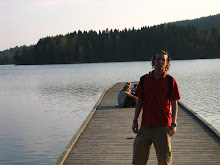Friday, 12 December 2008
A wiki is a page or collection of Web pages designed to enable anyone who accesses it to contribute or modify content, using a simplified markup language.
Wikis are often used to create collaborative websites and to power community websites.
The collaborative encyclopedia Wikipedia is one of the best-known wikis.
Wikis are used in business to provide intranet (click here to read a very interesting case study of a wiki used as intranet and realise all the advantages it has) and Knowledge Management systems.
Ward Cunningham, developer of the first wiki software, WikiWikiWeb, originally described it as "the simplest online database that could possibly work".
If you feel curious try to design your own wiki on any the following sites:
Following the IN PLAIN ENGLISH post I include here another video which explain in a very easy way the SOCIAL NETWORKING concept. This is the topic for my assignment so this video represents the starting point to get into the Social Networking field.
Enjoy it!
Social Networking in Plain English
Thursday, 11 December 2008
Wednesday, 10 December 2008

I thought I had run out of ideas to update my blog when I found this interesting website which presents every year the 10 technologies its research team think are most likely to change the way humans live. Here you are the 2008 proposal:
1) Modeling Surprise: 'Combining massive quantities of data, insights into human psychology, and machine learning can help manage surprising events.' (Horvitz, 2008)
2) Probabilistic Chips: 'A little uncertainty in chips could extend battery life in mobile devices--and maybe the duration of Moore's Law, too.' (Palem, 2008)
3) NanoRadio: Alex Zettl's tiny radios, built from nanotubes, could improve everything from cell phones to medical diagnostics. (Service, 2008)
4) Wireless Power: Physicist Marin Soljacic is working toward a world of wireless electricity. (Chu, 2008)
5) Atomic Magnetometers: John Kitching's tiny magnetic-field sensors will take MRI where it's never gone before. (Bourzac, 2008)
6) Offline Web Applications: 'Computing applications will become more powerful when they take advantage of the browser and the desktop.' (Lynch, 2008)
7) Graphene Transistors: A new form of carbon being pioneered by Walter de Heer of Georgia Tech could lead to speedy, compact computer processors. (Bullis, 2008)
8) Connectomics: Jeff Lichtman hopes to elucidate brain development and disease with new technologies that illuminate the web of neural circuits. (Singer, 2008)
9) Reality Mining: Sandy Pentland is using data gathered by cell phones to learn about human behavior. (Greene, 2008)
10) Cellullolityc Enzimes: Frances Arnold is designing better enzymes for making biofuels from cellulose. (Goho, 2008)
Thursday, 4 December 2008
I really like this web
'Wordle is a toy for generating “word clouds” from text that you provide. The clouds give greater prominence to words that appear more frequently in the source text. You can tweak your clouds with different fonts, layouts, and color schemes. The images you create with Wordle are yours to use however you like. You can print them out, or save them to the Wordle gallery to share with your friends.' (Jonathan Feinberg, 2008).
Try and create your own word cloud from a bunch of text, from an url and from your delicious tags. You will get surprised on the one hand because the design is beautiful and on the other hand because you will be able to realize which are the words you use the most. Have fun!!





